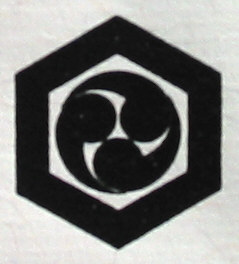
JAPANESE PRINTS
A MILLION QUESTIONS
TWO MILLION MYSTERIES
Ukiyo-e Prints浮世絵版画 |
|
formerly Port Townsend, Washington now Kansas City, Missouri |
|
UTAGAWA KUNISADA 歌川国貞 1786-1865 |
|
Series: Incense Box of a Contemporary Actor Tōsei haiyū kōbako 当世俳優香箱 |
|
Actor: Onoe Eizaburō III |
|
尾上栄三郎 |
| Role: The geisha Koito |
| 芸者小糸 |
|
Performance: At the Nakamura-za, Edo |
|
Date: 1838, 9th Month |
|
Tempō 9 |
|
天保9 |
|
Date Seal: Kiwame |
|
Publisher: Izumi-ya Ichibei |
|
和泉屋市兵衛 |
|
Signature: Kōchōrō Kunisada ga |
| 署名: 香蝶楼国貞画 |
|
Print Size: 14 5/8" x 9 1/2" |
|
There are other copies of this print in the collection of Waseda University, the University of Michigan and the Hankyu Culuture Foundation. |
| We know that there are at least six other prints in this series, probably more. |
|
Condition: Unbacked. Good color, very, very slight surface soiling and scuffing. A number of small wormholes and slight thinning of the paper on the lower right edge. |
|
$240.00 SOLD! |
 |
||
|
|
|
|
| Kiwame Seal |
PUBLISHER: Izumi-ya Ichibei |
|
|
|
|
|
|
|
ARTIST'S SEAL: Double toshidama |
|
|
"BAMBOO GRASS" ROUGE
|
||
|
|
|
|
|
|
|
|
|
|
Did you notice that green lower lip? |
|
|
|
|
|
|
|
SASABENI
笹紅 |
|
|
|
|
|
|
|
|
|
|
There were a number of cosmetic styles popular among the Japanese in the past which might strike one as a bit odd. There were the shaved eyebrows replaced by drawn on brows, but not where the originals had been. Then there was the 'sexy' practice of tooth blackening or ohaguro. However, compared to what surrounds us today in contemporary Western society such fashion statements seem tame by comparison. Just consider multi-colored hairdos, pierced nipples and navels and God knows what else, WOBS (wears only black), tummy and buttock tucks...and so much more. So, when it comes right down to it the Japanese practice of women glossing their lower lips to make it appear green is not very startling. Perhaps it was in its day, but...
John Fiorillo, who wrote and designed a wonderful site called "Viewing Japanese Prints" and is also involved in a commercial web site has often participated in chat groups dealing with questions involving various aspects of ukiyo. In those correspondences he answers many queries coming from individuals about their prints. In one case he responded at length about the use of sasabeni and gives tons of information, but cites no sources. I was able to corroborate some of what he says, but not all of it. According to the Kodansha Encyclopedia of Japan (vol. 1, p. 38, entry by Takahasi Masao) it states that earliest evidence of highlighting the face with red may have been more ritualistic than cosmetic and is probably not related to the rouge that was so popular in later ages. Beni was made from safflower, a plant which was imported into Japan from China in the early 7th century, but was so expensive and rare that it did not come into general use until a thousand years later. "At the end of the 18th century, sasabeni, an iridescent greenish rouge, applied mainly to the lower lip, became the vogue and continued to the 19th century." Fiorillo adds that Japanese women may have done this to try to reduce the appearance of their fuller lower lips. This may or may not be true. We all know that vertical stripes make one look broader and vertical stripes or black are said to be slimming. However, drawing one's attention to one's lower lip seems a rather odd way of trying to cover what the ladies may have thought of as a rather unsightly flaw. On the contrary it would seem to me that it would draw undue attention to it. Eventually, as the Kodansha entry also notes, like so many other native practices beni/rouge was eventually supplanted by the importation of Western cosmetics. In Jewels of Japanese Printmaking: Surimono of the Bunka-Bunsei Era 1804-30 by Joan Mirviss and John Carpenter (cat. entry #11, p. 58) translate the beginning of a poem by Chikushien Itoyori on one print: "At Mount Arima / as bath girls apply / 'bamboo-grass' rouge..." John Carpenter notes that "The poem conjures up a more notorious aspect of Arima - the hotsprings prostitutes who catered to male clients." Later he adds that "Sasa beni [here two word which he does not even hyphenate, but does italicize]...refers to the effect created when a thin layer of rouge is applied to the lips over charcoal and takes on a greenish hue." |
||
|
|
||
| View of the back of the print. |






 HOME
HOME